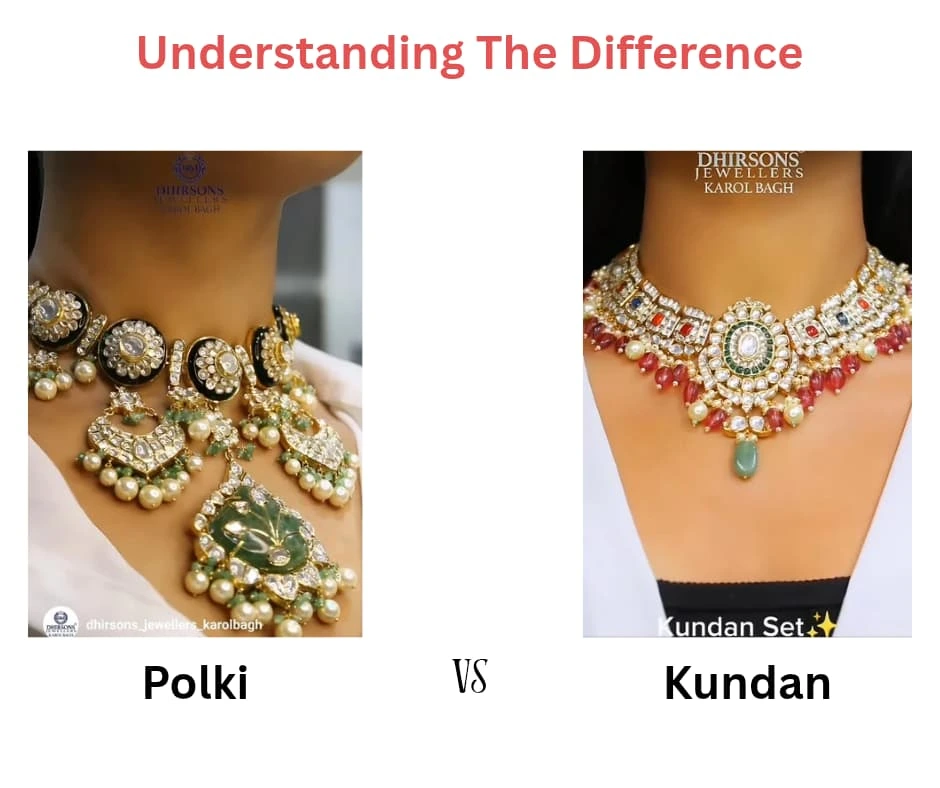
Polki vs Kundan: What’s the Difference?
By Dhirsons Jewellers, Karol Bagh
Polki vs Kundan: Unveiling the Timeless Allure – What's the Difference?
By Dhirsons Jewellers, Karol Bagh For those enchanted by the rich
heritage of Indian jewellery, the terms Polki and Kundan frequently
arise, often sparking curiosity about their distinct identities. While
both styles exude a regal charm and have graced the adornments of
royalty for centuries, they represent fundamentally different techniques
and aesthetics. At Dhirsons Jewellers in Karol Bagh, we deeply
appreciate the unique beauty of each, and we're here to illuminate the
captivating differences between Polki and Kundan.
Polki: Embracing the Untamed Brilliance of Natural Diamonds
jewellery is steeped in history, with its origins tracing back to the
Mughal era. Its defining characteristic lies in the use of uncut,
natural diamonds. These diamonds, often sourced from the ancient mines
of Golconda, retain their original, unshaped form, showcasing their
inherent texture and a unique, raw, earthy shine that differs
significantly from the dazzling brilliance of modern, cut diamonds. The
artistry of Polki lies in meticulously setting these uncut diamonds
within intricate frameworks of pure gold, often using techniques that
have been passed down through generations. The stones are carefully
selected and arranged to maximize their natural luster, creating pieces
that possess a weighty presence and an undeniable royal aura. Due to the
inherent value of natural diamonds and the intricate craftsmanship
involved in their setting, Polki jewellery tends to be heavier in terms
of both weight and price point. Polki's majestic and timeless appeal
makes it an ideal choice for weddings and other grand celebrations. Its
traditional significance and opulent aesthetic perfectly complement
bridal ensembles and heirloom collections, embodying a sense of enduring
elegance and heritage. Each Polki piece tells a story of the earth's
natural treasures and the skilled hands that brought them to life.
Kundan: The Radiant Grandeur of Layered Glass and Gold
In contrast, Kundan jewellery employs a distinct technique that involves
setting glass pieces within elaborate designs crafted from pure gold.
The process is characterized by the meticulous layering of gold foil
between the glass and the gold framework. This gold foil not only
secures the glass but also enhances its reflectivity, giving Kundan
jewellery a vibrant and equally grand appearance, albeit with a
different kind of radiance than Polki's natural diamond shimmer.
Kundan's origins are also deeply rooted in Indian history, flourishing
particularly in the royal courts of Rajasthan and Gujarat. The use of
glass allows for a wider range of vibrant colors and intricate designs,
often incorporating enamel work (Meenakari) to further enhance its
visual appeal. Compared to Polki, Kundan jewellery is generally lighter
in weight and more affordable, making it accessible for a broader range
of occasions and preferences. While Kundan may not feature natural
diamonds, its intricate designs and the skillful use of gold and vibrant
glass create pieces that are undeniably striking and possess their own
unique charm. It’s a versatile style that can be worn for various
festive occasions and celebrations, offering a touch of traditional
grandeur without the significant weight and cost associated with Polki.
Still Captivated by the Mystery? Witness the Difference Firsthand!
Understanding the nuances between Polki and Kundan truly comes to life
when you see and feel the difference. We warmly invite you to visit our
Karol Bagh store at Dhirsons Jewellers. Our knowledgeable artisans and
curated collections will allow you to experience the raw beauty of
Polki's uncut diamonds alongside the vibrant artistry of Kundan's
layered glass and gold. Come, explore these timeless styles side by
side, and let us help you discover the perfect piece that resonates with
your individual taste and the significance of your special moments.
 Dhirsons Jewellers Karol Bagh
Dhirsons Jewellers Karol Bagh

